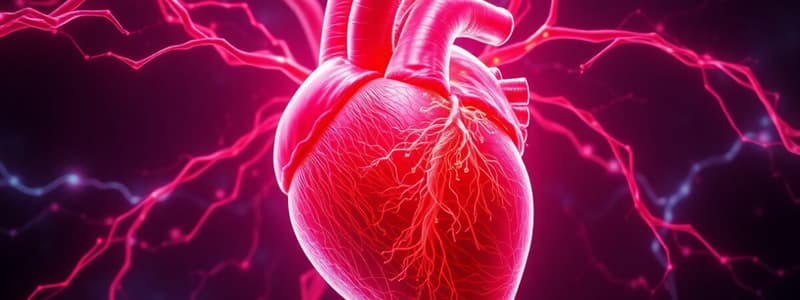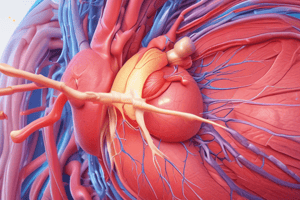Podcast
Questions and Answers
What is the main characteristic that prevents cardiac muscle from sustaining tetanic contraction?
What is the main characteristic that prevents cardiac muscle from sustaining tetanic contraction?
- Rapid calcium uptake
- Long refractory period (correct)
- High energy consumption
- Frequency of action potentials
Which of the following describes a characteristic of cardiac muscle that distinguishes it from skeletal muscle?
Which of the following describes a characteristic of cardiac muscle that distinguishes it from skeletal muscle?
- Innervated by the somatic nervous system
- Striated appearance
- Voluntary control
- Syncytium formation (correct)
What role do intercalated discs play in cardiac muscle function?
What role do intercalated discs play in cardiac muscle function?
- They anchor the muscle fibers to the skeleton.
- They store calcium ions for muscle contraction.
- They facilitate electrical and ionic coupling between cells. (correct)
- They separate the atrial and ventricular muscles.
Which property of cardiac muscle refers to its ability to generate action potentials spontaneously?
Which property of cardiac muscle refers to its ability to generate action potentials spontaneously?
What are the two functional syncytia present in the heart?
What are the two functional syncytia present in the heart?
Which property of cardiac muscle is best defined as its ability to stretch and still generate force?
Which property of cardiac muscle is best defined as its ability to stretch and still generate force?
What are the four main properties of cardiac muscle?
What are the four main properties of cardiac muscle?
Which type of circulation is associated with the right pump of the heart?
Which type of circulation is associated with the right pump of the heart?
Flashcards are hidden until you start studying
Study Notes
Cardiac Muscle Properties
- Cardiac muscle is found in the heart and is responsible for pumping blood throughout the body.
- It is distinct from skeletal muscle, which is responsible for voluntary movement.
- Excitability: Cardiac muscle can respond to stimuli by generating action potentials. This ability is essential for initiating and coordinating heart contractions.
- Automaticity: Cardiac muscle has the intrinsic ability to generate its own electrical impulses, allowing the heart to beat independently of external stimulation.
- Conductivity: Cardiac muscle cells are interconnected by gap junctions, forming a functional syncytium. This allows electrical impulses to spread quickly and efficiently throughout the heart, ensuring coordinated contraction.
- Contractility: Cardiac muscle has the ability to contract forcefully in response to electrical stimulation, enabling blood to be pumped throughout the circulatory system.
- Rhythmicity: The heart exhibits a regular pattern of contractions, ensuring a steady and rhythmic blood flow.
Comparison with Skeletal Muscle
- Automaticity: Skeletal muscle requires external nerve stimulation to contract, while cardiac muscle can spontaneously generate its own electrical impulses.
Comparison with Nerve Action Potential
- Duration: Cardiac action potentials are significantly longer than nerve action potentials, preventing sustained tetanic contractions in the heart. This allows for appropriate relaxation time between contractions, ensuring proper blood flow.
Heart Structure
- The heart is a four-chambered organ responsible for circulating blood throughout the body.
- Two types of valves, atrioventricular (AV) valves and semilunar valves, control blood flow within the heart.
- The heart functions as two pumps:
- Right pump: Pumps deoxygenated blood to the lungs for oxygenation.
- Left pump: Pumps oxygenated blood to the rest of the body.
- The heart is composed of two types of muscle:
- Cardiac muscle proper: Makes up the atrial and ventricular walls.
- Conductive system: Specialized muscle tissue responsible for generating and conducting electrical impulses throughout the heart.
- Functional syncytia: The heart operates as two functional syncytia, atrial and ventricular, due to the interconnection of muscle cells through gap junctions. This ensures the chambers contract as a unit.
Studying That Suits You
Use AI to generate personalized quizzes and flashcards to suit your learning preferences.




